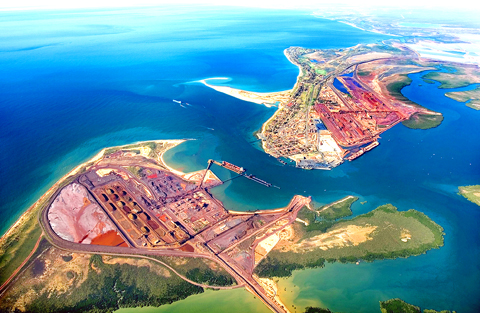BHP Billiton, the world’s biggest miner, fired a warning over the economic recovery yesterday despite smashing forecasts with half-year profits of US$6.14 billion.
BHP said the global economy had hauled itself out of the doldrums of the financial crisis but cautioned that advanced countries were expected to lag growth in the developing world.
First-half profits to December more than doubled — up 134 percent — from the US$2.62 billion recorded a year earlier, as emergency government stimulus prompted a recovery in demand.

PHOTO: BLOOMBERG
“We remain cautious about the speed and strength of the global economic recovery across the developed world despite the positive momentum in the developed countries,” chief executive Marius Kloppers told reporters.
BHP said strong sales volume growth had boosted its bottom line along with December’s US$340 million sale of the Ravensthorpe mine in Western Australia, the source of a goodwill impairment charge in 2008.
Profit excluding exceptional items fell 7 percent to US$5.7 billion. BHP announced a dividend of US$0.42 per share, up 2.4 percent on a year earlier.
“Given the volatility that we had in the 12 months preceding, we are very pleased with these results,” Kloppers said.
BHP said global conditions had improved with the US and Europe lifting their dismal industrial output while China returned to double-digit growth and India proved resilient.
It said it would keep a close eye on China’s credit-tightening and noted that many of its orders came from restocking, warning that “real end demand still appears sporadic.”
“Notwithstanding our caution in the short term, over the long term we continue to expect emerging economies’ growth to strongly outperform the developed countries as they follow a path of continued urbanization and industrialization,” BHP said.
“Any effects on commodity demand due to potential weakness in developed countries are likely to be offset over time by continuing growth as China and India urbanize and industrialize,” it said.
Kloppers said demand for key steelmaking material iron ore was extremely strong, particularly from China, with prices on the spot market almost double the contracted benchmark price.
“That would indicate that there is extremely strong demand on the back of China’s iron ore imports surprising everybody to the upside in the last six months,” he said.

MORE VISITORS: The Tourism Administration said that it is seeing positive prospects in its efforts to expand the tourism market in North America and Europe Taiwan has been ranked as the cheapest place in the world to travel to this year, based on a list recommended by NerdWallet. The San Francisco-based personal finance company said that Taiwan topped the list of 16 nations it chose for budget travelers because US tourists do not need visas and travelers can easily have a good meal for less than US$10. A bus ride in Taipei costs just under US$0.50, while subway rides start at US$0.60, the firm said, adding that public transportation in Taiwan is easy to navigate. The firm also called Taiwan a “food lover’s paradise,” citing inexpensive breakfast stalls

TRADE: A mandatory declaration of origin for manufactured goods bound for the US is to take effect on May 7 to block China from exploiting Taiwan’s trade channels All products manufactured in Taiwan and exported to the US must include a signed declaration of origin starting on May 7, the Bureau of Foreign Trade announced yesterday. US President Donald Trump on April 2 imposed a 32 percent tariff on imports from Taiwan, but one week later announced a 90-day pause on its implementation. However, a universal 10 percent tariff was immediately applied to most imports from around the world. On April 12, the Trump administration further exempted computers, smartphones and semiconductors from the new tariffs. In response, President William Lai’s (賴清德) administration has introduced a series of countermeasures to support affected

CROSS-STRAIT: The vast majority of Taiwanese support maintaining the ‘status quo,’ while concern is rising about Beijing’s influence operations More than eight out of 10 Taiwanese reject Beijing’s “one country, two systems” framework for cross-strait relations, according to a survey released by the Mainland Affairs Council (MAC) on Thursday. The MAC’s latest quarterly survey found that 84.4 percent of respondents opposed Beijing’s “one country, two systems” formula for handling cross-strait relations — a figure consistent with past polling. Over the past three years, opposition to the framework has remained high, ranging from a low of 83.6 percent in April 2023 to a peak of 89.6 percent in April last year. In the most recent poll, 82.5 percent also rejected China’s

PLUGGING HOLES: The amendments would bring the legislation in line with systems found in other countries such as Japan and the US, Legislator Chen Kuan-ting said Democratic Progressive Party (DPP) Legislator Chen Kuan-ting (陳冠廷) has proposed amending national security legislation amid a spate of espionage cases. Potential gaps in security vetting procedures for personnel with access to sensitive information prompted him to propose the amendments, which would introduce changes to Article 14 of the Classified National Security Information Protection Act (國家機密保護法), Chen said yesterday. The proposal, which aims to enhance interagency vetting procedures and reduce the risk of classified information leaks, would establish a comprehensive security clearance system in Taiwan, he said. The amendment would require character and loyalty checks for civil servants and intelligence personnel prior to